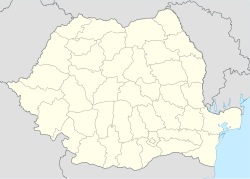Jidava (or Jidova) was a fort (also called Campulung Muscel fort) in the Roman province of Dacia 4 km southwest of the town of Campulung, Romania. It was built around 190–211 AD as part of the frontier system of the Limes Transalutanus located approximately 20 km south of the Rucăr-Bran pass.
| Jidava | |
|---|---|
 | |
| Alternative name(s) | Jidova, Sidova |
| Known also as | Câmpulung fort |
| Founded during the reign of | Commodus or Septimius |
| Founded | 190 – 211 AD |
| Previous fortification | Dacian |
| Place in the Roman world | |
| Province | Dacia |
| Administrative unit | Dacia Malvensis |
| Administrative unit | Dacia Inferior |
| Limes | Transalutanus |
| Directly connected to | |
| Structure | |
| — Stone[1] structure — | |
| Size and area | 100 m × 132 m (1.3 ha) |
| Stationed military units | |
| — Cohorts — | |
| I Flavia Commagenorum | |
| Location | |
| Coordinates | 45°13′14.69″N 25°00′44.95″E / 45.2207472°N 25.0124861°E |
| Place name | Apa sărată |
| Town | Câmpulung |
| County | Argeș |
| Country | |
| Reference | |
| RO-LMI | AG-I-m-A-13357.02 |
| Site notes | |
| Recognition | |
| Discovery year | 1876 |
| Condition | Partially reconstructed |
| Excavation dates |
|
| Archaeologists | Dimitrie Butculescu |
It has been excavated and can be seen today.
The site is administered by the Argeș County Museum.[2]
The first wooden buildings were destroyed by a fire dated by coins of Geta and Severus Alexander (222). The stone buildings built afterwards were again destroyed by fire dated by a coin of Philip II (246), the latest coin discovered on the limes.[3]
Small thermal baths were at the NE end of the praetorium, built of brick after the stone praetorium, and overlapping the via sagularis and part of the agger.[4]
Campulung Muscel II
editA smaller fort or castellum (Campulung Muscel II) was about 300m to the south at Biserica Jidovilor. Inside, a two-roomed building equipped with a heating system (hypocaust) and traces of wooden barracks have been identified. A date of beginning of the 2nd century is likely.
Gallery
edit-
The plan of the castrum
-
The front of reconstructed wall and tower
-
The back of reconstructed wall and tower
-
Praetorium
-
Hypocaust room of Praetorium
See also
editNotes
edit- ^ TRUPE FARA CASTRE, CASTRE FARA TRUPE ÎN DACIA, Dan Matei[permanent dead link]
- ^ (in Romanian) Enciclopedia Argeșului și Muscelului - M Archived 2014-08-30 at the Wayback Machine, at the University of Pitești Enciclopedia Argeșului și Muscelului site Archived 2016-03-31 at the Wayback Machine, p. 123
- ^ Frontiera romană din Dacia Inferior. O trecere în revistă și o actualizare. LIMES / Nr. 11 / 2022 Proceedings of the Limes Congress XXV, Nijmegen 21-27 August 2022
- ^ Petolescu, C.C., Matei-Popescu, F., Dumitrescu, I. și Piţigoi, A. Cronica Cercetărilor Arheologice, 68-76, nr. 11 2020
External links
edit- Media related to Castra Jidava at Wikimedia Commons
- Roman castra from Romania - Google Maps / Earth Archived 2012-01-17 at the Wayback Machine

